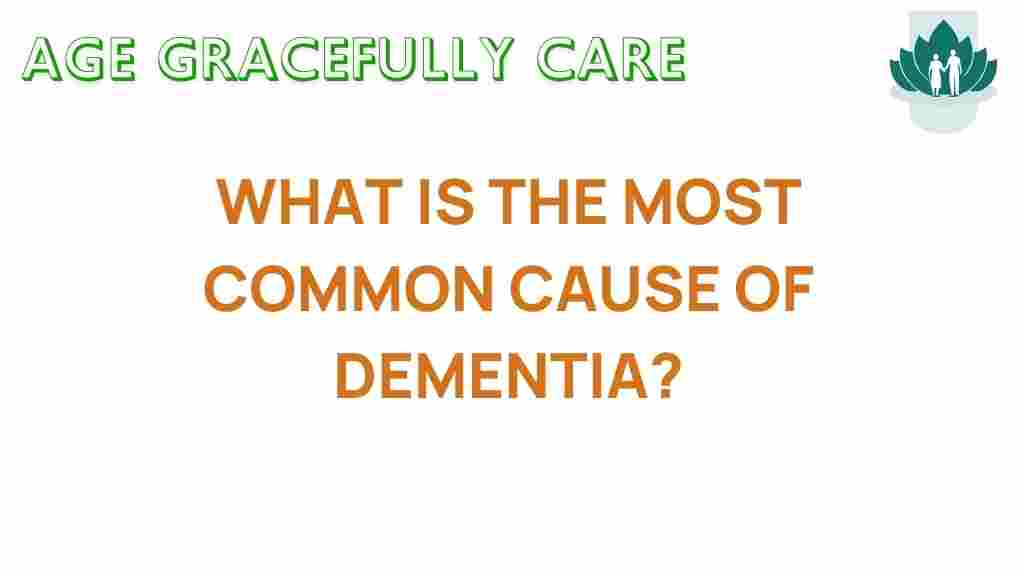Unveiling the Most Common Cause of Dementia: What You Need to Know
Dementia is a term that encompasses a variety of neurological conditions characterized by cognitive decline, memory loss, and impaired thinking. Among the different types of dementia, **Alzheimer’s disease** stands out as the most prevalent, accounting for 60-80% of cases. Understanding the causes, risk factors, and implications of dementia, especially Alzheimer’s, is essential for maintaining brain health as we age. In this article, we will delve into the most common causes of dementia, explore the nuances of cognitive decline, and provide insights to help you or your loved ones maintain mental health.
Understanding Dementia and its Types
Dementia is not a single disease but a general term that describes a range of symptoms affecting memory, thinking, and social abilities severely enough to interfere with daily life. The most common forms of dementia include:
- Alzheimer’s Disease: The leading cause of dementia, characterized by gradual memory loss and cognitive decline.
- Vascular Dementia: Often a result of a stroke or other conditions that block blood flow to the brain.
- Lewy Body Dementia: Associated with abnormal protein deposits in the brain, leading to cognitive fluctuations, visual hallucinations, and movement problems.
- Frontotemporal Dementia: Affects the frontal and temporal lobes of the brain, leading to changes in personality and behavior.
The Most Common Cause: Alzheimer’s Disease
Among these types, Alzheimer’s disease is the most common cause of dementia. It is a complex condition with several contributing factors, but primarily it’s characterized by:
- Neurodegeneration: The progressive loss of neurons and synapses in the brain.
- Amyloid Plaques: Clusters of proteins that accumulate between neurons, disrupting communication.
- Tau Tangles: Twisted fibers that form inside dying cells, further impairing brain function.
Risk Factors for Alzheimer’s Disease
Understanding the risk factors associated with Alzheimer’s disease can help in early detection and prevention strategies. These risk factors include:
- Aging: The most significant risk factor, with most cases occurring in individuals aged 65 and older.
- Family History: Genetics play a role; individuals with a family history of Alzheimer’s are at a higher risk.
- Head Injuries: Traumatic brain injuries can increase the likelihood of developing dementia later in life.
- Heart Health: Conditions like hypertension, diabetes, and high cholesterol may elevate the risk of Alzheimer’s.
- Lifestyle Factors: Poor diet, lack of exercise, smoking, and excessive alcohol consumption can negatively impact brain health.
Signs and Symptoms of Cognitive Decline
Cognitive decline manifests in various ways. Recognizing early signs can be crucial for timely intervention:
- Memory loss that disrupts daily life, such as forgetting recently learned information.
- Difficulty planning or solving problems, like following a familiar recipe.
- Challenges in completing familiar tasks at home or work.
- Confusion with time or place, losing track of dates or seasons.
- Changes in mood or personality, which may lead to withdrawal from social activities.
Maintaining Brain Health and Preventing Alzheimer’s
While some risk factors for Alzheimer’s disease cannot be changed, there are several proactive measures individuals can take to promote brain health and potentially reduce the risk of cognitive decline:
- Regular Physical Activity: Engaging in at least 150 minutes of moderate aerobic exercise per week can enhance blood flow to the brain.
- Healthy Diet: Following a balanced diet rich in fruits, vegetables, whole grains, and healthy fats (such as the Mediterranean diet) supports brain health.
- Mental Stimulation: Activities like puzzles, reading, and learning new skills can help build cognitive reserve.
- Social Engagement: Maintaining social connections and participating in community activities may protect against cognitive decline.
- Quality Sleep: Good sleep hygiene is crucial for brain health; aim for 7-9 hours of quality sleep each night.
Step-by-Step Process for Monitoring Cognitive Health
Monitoring cognitive health is essential, especially as we age. Here’s a simple step-by-step process to follow:
- Regular Check-Ups: Schedule annual health check-ups to assess your overall health and discuss any cognitive concerns with your doctor.
- Self-Assessment: Keep track of your memory and cognitive abilities. Note any changes or difficulties and discuss them with your healthcare provider.
- Engage in Cognitive Activities: Incorporate activities that challenge your brain into your daily routine, such as learning a new language or instrument.
- Maintain a Healthy Lifestyle: Focus on nutrition, exercise, and social interactions that promote brain health.
- Educate Yourself and Others: Stay informed about dementia and Alzheimer’s disease. Share knowledge with family members to foster support systems.
Troubleshooting Tips for Caring for a Loved One with Dementia
Caring for someone with dementia can be challenging. Here are some troubleshooting tips to ease the caregiving process:
- Establish Routines: Predictable routines can provide comfort and reduce anxiety for those with dementia.
- Use Clear Communication: Speak slowly and clearly, using simple language. Avoid overwhelming them with complex information.
- Modify the Environment: Ensure the living space is safe and comfortable. Remove hazards and provide clear labels for common items.
- Encourage Independence: Allow them to engage in daily activities as much as possible to maintain their sense of self.
- Seek Support: Join support groups for caregivers to share experiences and gain insights from others in similar situations.
Conclusion
Understanding dementia, particularly Alzheimer’s disease, is critical as we navigate the complexities of aging and cognitive decline. By recognizing the risks, symptoms, and proactive measures for maintaining brain health, individuals can take significant steps toward preserving their cognitive abilities. Whether through lifestyle changes, mental engagement, or supportive care for loved ones, addressing the challenges of dementia is a collective effort. For more information on brain health and dementia, consider checking resources from organizations like the Alzheimer’s Association.
In conclusion, staying informed and proactive can lead to better outcomes for those affected by dementia. Embrace the opportunities for learning, engage in healthy practices, and foster supportive environments to combat the challenges posed by this condition.
This article is in the category Health and created by AgeGracefullyCare Team
